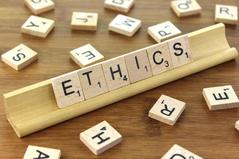
Organizational researchers study perceptions and how these perceptions are related to other factors such as job satisfaction or performance. Research has indicated perceptions of ethical leadership are related to job satisfaction and employee commitment.
In a study reported in a 2014 issue of the Journal of Business Ethics, Monica Sharif and Terri Scandura extended the research on ethical leadership to organizational change. They hypothesized that “one important source of employees’ response to change may be the ethicality of their leader.” Organizational change can be a time of great strain on leaders as well as subordinates. Leaders seen as ethical may influence subordinates positively. Ethical leaders have a greater chance of having employee support even if the decisions are difficult or unpopular.
Working from a survey of about 200 supervisor-subordinate dyads, Sharif and Scandura confirmed findings that leaders perceived as ethical have employees who are:
- more satisfied with their jobs
- perform better
- engage in greater organizational citizenship (e.g., going beyond their duties to help others and the organization).
In regards to organizational change, those who experienced change and perceived their leaders were ethical outperformed those not experiencing change. Performance was actually higher during times of change where leaders were seen as fair and trustworthy.
They concluded “ethical leadership may amplify the effects of involvement.”
My take-aways:
1. Perceptions are reality. Sharif and Scandura raise an important question. Organizational change is hard. Leaders who are not seen as trustworthy or fair would seem to handicap the change effort. On the other hand, fair and trustworthy leadership can inspire success, even when difficult.
2. My guess is ethical leadership is situational. It is possible to see a leader as ethical in some situations but not in others. Likewise, another employee may see the situation exactly opposite. The key for leaders is to understand how perceptions of their fairness impact employee performance and understand themselves well enough to know how they are perceived. This means leaders must seek realistic feedback from those they trust, those who will be open and honest with them. Leaders should know themselves.
3. I suspect culture plays a large role here. To what degree are trust, honesty, and transparency core values in your organization’s culture? Ethical leaders should excel in trusting cultures. But ethical leaders may be needed even more in cultures that lack trust.
Sharif, M. M., & Scandura, T. A. (2014). Do perceptions of ethical conduct matter during organizational change? Ethical leadership and employee involvement. Journal of Business Ethics, 124(2), 185-196.
Image, “Ethics” by Nick Youngson (http://nyphotographic.com). Obtained from http://www.thebluediamondgallery.com/wooden-tile/e/ethics.html
Used with permission: Creative Commons 3 - CC BY-SA 3.0
© John Ballard, PhD, 2017. All rights reserved.
Author, Decoding the Workplace, BEST CAREER BOOK Next Generation Indie Book Awards 2016.
Please visit www.decodingtheworkplace.com.
 RSS Feed
RSS Feed